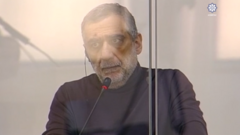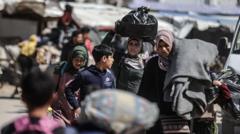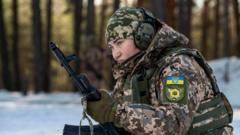Ruben Vardanyan, one of Armenia’s wealthiest individuals, finds himself embroiled in a significant trial in Azerbaijan, where he risks life imprisonment as a military court addresses war crime charges against him and other former Armenian leaders amid a historic peace initiative.
Billionaire's Legal Battle Amid Azerbaijan's Historic Peace Moves: A Tale of Conflict and Controversy

Billionaire's Legal Battle Amid Azerbaijan's Historic Peace Moves: A Tale of Conflict and Controversy
As Azerbaijan and Armenia edge closer to a peace agreement, a billionaire faces dire consequences, rendering his wealth powerless.
Ruben Vardanyan, the Russian-Armenian billionaire and self-styled leader of Nagorno-Karabakh, is currently facing significant legal challenges in Azerbaijan that threaten to overshadow the peace negotiations between Azerbaijan and Armenia. Vardanyan, aged 56, has garnered attention for his alleged involvement in war crimes that date back decades—charges that could land him a life sentence in a military court in Baku.
The trial follows a tense backdrop of renewed violence and territorial disputes after peace discussions seemed imminent between the two countries, which have shared a fraught history over the Nagorno-Karabakh region. Following a military operation by Azerbaijan in September 2023 that took control of the territory, Vardanyan, perceived by many as a key player in advocating for ethnic Armenians, was arrested during a mass exodus to Armenia.
Images from the courtroom have raised alarms—showing what appeared to be bruising on his forehead and sparking allegations of torture from legal advocates, which Baku has firmly denied, insisting compliance with international standards regarding his detention. With Vardanyan’s high-profile history as a philanthropist and business leader, having founded Russia’s first investment bank, his dramatic downfall stands in stark contrast to his previous status as a prominent figure alongside international celebrities.
Since his arrest, Vardanyan’s family reports that he has been subjected to solitary confinement and has gone on hunger strikes, protesting what he views as unjust treatment. The timing of his trial coincides with critical peace negotiations that exclude discussions on prisoner pardons, raising concerns that Vardanyan and his co-defendants may serve as sacrificial pawns in a broader political game.
Armenian officials have expressed distress over the neglect of prisoner rights, while critics of Azerbaijani President Ilham Aliyev's government have labeled the trials as politically motivated show trials aimed at suppressing Armenian visibility during peace discussions. With a historical peace agreement on the horizon, there is rising anxiety that the fate of Vardanyan and others cannot be separated from the complexities of negotiation and regional stability, an assertion Vardanyan has echoed in messages to his supporters.
As Vardanyan’s case unfolds, the intersection of wealth, power, and human rights remains fiercely contested in the courtrooms of Baku and the hearts of Armenians across the divided territories.


















